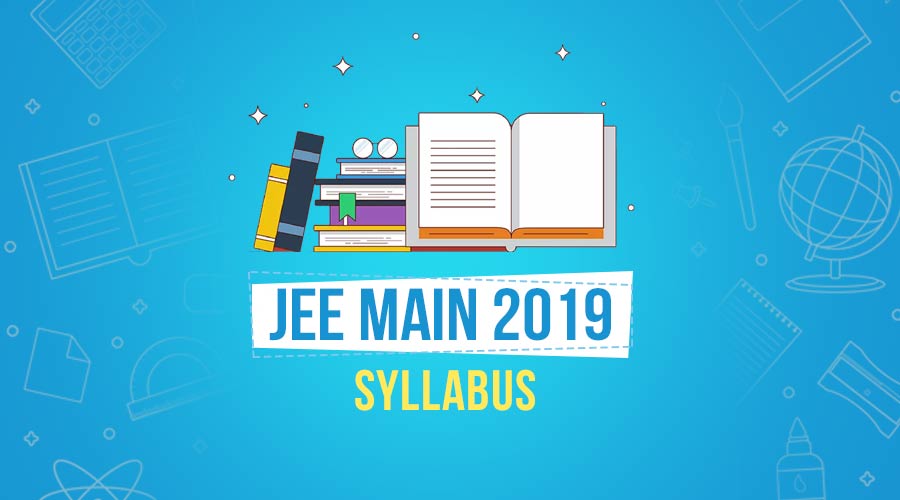The Joint Entrance Exam (JEE) conducted by the Central Board of Secondary Education (CBSE), is one India’s toughest exams and the gateway to top government-funded engineering institutes of the country. The first necessary step for aspirants of the exam is to know the syllabus in-depth.
The Current Trends
Just like previous years, the JEE syllabus will be as prescribed by CBSE, from 11th and 12th standard NCERT textbooks. So, to prepare well, aspirants need to be thorough with all concepts in the NCERT books.
It has been reported that the JEE might be conducted twice a year by National Testing Agency (NTA). If reports are to be believed, aspirants can expect some changes in the pattern of the exam. Though the pattern of the exam might change, it is highly likely that JEE 2019 syllabus will be from NCERT.
JEE 2019 Tentative Dates
| Events | Dates |
|---|---|
| JEE Main 2019 Exam | 2nd week of April 2019 |
| JEE Main 2019 Result | 4th week of April 2019 |
JEE Main 2019 Syllabus
The question paper of JEE Main is set from Physics, Chemistry, and Mathematics. The syllabus has two sections namely, Section A and Section B. Section A is about 80% of the paper and tests an aspirant’s theoretical knowledge. Section B tests the practicality of the concepts and is about 20% of the paper.
Here is a subject wise detailed syllabus of JEE Main 2019:
Physics
| Topics |
|---|
| Physics & Measurement |
| Laws of Motion |
| Kinetic Theory of Gases |
| Oscillations & Waves |
| Kinematics |
| Work, Energy & Power |
| Rotational Motion |
| Gravitation |
| Properties of Solids and Liquids |
| Thermodynamics |
| Magnetic effects of Current and Magnetism |
| Electromagnetic Waves |
| Electromagnetic Induction and Alternating currents |
| Dual Nature of Nature and Radiation |
| Communication System |
| Atoms and Nuclei |
| Electronic Devices |
| Electrostatics |
| Current Electricity |
| Optics |
Mathematics
| Topics |
|---|
| Permutation & Combination |
| Mathematical Induction |
| Complex Numbers & Quadratic Equation |
| Matrices & Determinants |
| Binomial Theorem |
| Sequencers & Series |
| Sets, Relations & Functions |
| Limit, Continuity & Differentiability |
| Integral Calculus |
| Differential Equations |
| Statistics & Probability |
| Three Dimensional Geometry |
| Vector Algebra |
| Trigonometry |
| Mathematical Reasoning |
| Coordinate Geometry |
Chemistry
Physical Chemistry-
| Topics |
|---|
| Basic Concepts of Chemistry |
| Chemical Thermodynamics |
| Chemical Kinetics |
| Surface Chemistry |
| States of Matter |
| Atomic Structure |
| Chemical Bonding & Molecular Structure |
| Solution |
| Equilibrium |
| Redox Reactions and Electrochemistry |
Inorganic Chemistry
| Topics |
|---|
| Classifications of Elements and Periodicity in Properties |
| Coordination Compounds |
| Environmental Chemistry |
| Block Elements |
| Block Elements (Other Groups) |
| General Principles and Processes of Isolation of Metals |
| D- and -f Block Elements |
| Hydrogen |
Organic Chemistry
| Topics |
|---|
| Purification and Characterisation of Organic Compounds |
| Organic Compounds Containing Halogens |
| Organic Compounds Containing Oxygen |
| Some Basic Principles of Organic Chemistry |
| Organic Compounds Containing Nitrogen |
| Chemistry in Everyday Life |
| Polymers |
| Biomolecules |
| Principles Related to Practical Chemistry |
| Hydrocarbons |
What’s Next?
It is important to deeply analyse the syllabus before beginning preparation. So, what’s next? Here are a few steps for aspirants to kick-start their preparations:
- Get hold of the best books and study materials.
- Create a study schedule with ample time for self-study.
- Learn all the concepts and make sure you test yourself on your proficiency.
- As the exam date inches closer increase time for revision.
- Take mock tests and solve previous year papers.
- Keep an eye out for all important dates related to exam.
All the best!

